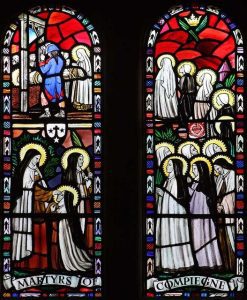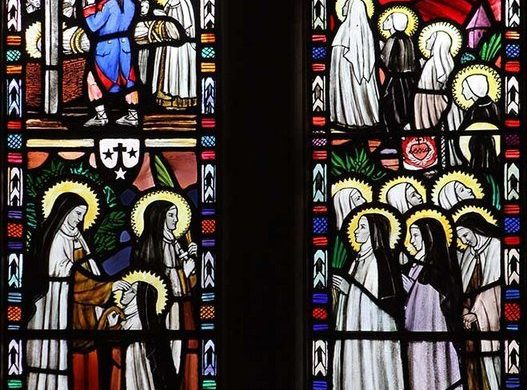VATICAN CITY (CNS) – Pope Francis has declared as saints 16 Carmelite martyrs executed by guillotine during the French Revolution and confirmed the martyrdom and heroic virtues of five others in a series of decrees published Dec. 18.
Using what the Vatican called an “equipollent” or equivalent canonization, Pope Francis approved adding to the canon of saints Blessed Teresa of St. Augustine and 15 other members of the Carmelites of Compiègne killed during the French Reign of Terror.

The French revolutionary government outlawed religious life in 1790 and the community of Carmelites in Compiègne was forced to leave their convent two years later. In 1794, after being discovered to have continued living in community as consecrated women, they were tried and publicly executed by guillotine.
The decree, supported by the cardinals and bishops who are members of the Dicastery for the Causes of Saints, was approved by Pope Francis and extends devotion to the Carmelite martyrs to the universal church.
The other decrees approved by Pope Francis Dec. 18 included recognition of the martyrdom of Archbishop Eduard Profitlich, who died in a Russian prison in 1942.
Archbishop Proffitlich was born in the German empire in 1890, joined the Jesuits and served as a nurse in the First World War before being ordained a priest. He was later made a titular archbishop and served as apostolic administrator of Estonia, where he remained following the Soviet occupation of the country in 1940.
The archbishop was arrested after Germany’s attack on the Soviet Union in 1941 and was taken prisoner in Russia, where he was charged with anti-Soviet agitation and espionage. He died from exposure Feb. 22, 1942.
The pope also recognized the martyrdom of Salesian Father Elia Comini, who was born near Bologna, Italy, May 7, 1910, and was killed out of hatred of the faith Oct. 1, 1944, during World War II.
The priest had been serving the local population in his hometown, which had become a fierce battleground between the German occupiers and the Allies. He and Father Martino Capelli celebrated Mass, taught catechism, cared for refugees and the sick, buried the dead and sought to be peacemakers, even between the Allies and Germans.
Under enemy fire, Fathers Comini and Capelli went to help some 69 hostages being held by the German S.S., but the priests were accused of being spies and were incarcerated with other prisoners, whom they also ministered to. They were all condemned to death, and Father Comini was shot with the others.
The recognition of a sainthood candidate’s martyrdom clears the way to beatification.
Pope Francis also recognized the heroic virtues of Pierre Goursat, a layman and founder of the Emmanuel Community. Born Aug. 15, 1914, in Paris, he experienced a profound spiritual conversion when he was 19 years old.
He managed his family’s boarding house, opened a religious bookstore and established a publishing house in Paris. After joining a group of the Legion of Mary, he met Dominican Father Raymond Pichard, the first to broadcast Sunday Mass on television in France in 1949, and he realized the importance of mass media as a tool for evangelization.
Goursat organized debates, often with directors and actors, in large halls with the public after showing films, eventually establishing the French Cinema Circle in 1951. He became secretary-general of the French Catholic Office of Cinema in 1960 and built close relationships with producers, directors and actors. He also participated in the Cannes and Venice film festivals.
Goursat became active with the charismatic renewal movement and eventually founded the Emmanuel Community in 1972 in France as part of the movement. He retired from managing the community after a heart attack in 1985 and spent the rest of his life in silence and adoration, dying March 25, 1991.
The two other decrees Pope Francis signed Dec. 18 regarded:
— The heroic virtues of Bishop Áron Márton of Alba Iulia, Romania, who lived 1896-1980. An ethnic Hungarian, he ministered to what had become a Catholic minority in Transylvania. After World War II, communists tried to destroy the faith in Romania and to limit the rights of ethnic minorities. He was arrested in 1949 and imprisoned until 1955. Though allowed to return to his diocese as bishop, he was placed under house arrest from 1957 to 1968, after which he was free to govern his diocese. He died from cancer in 1980.
— The heroic virtues of Italian Redemptorist Father Giuseppe Maria Leone, who lived from 1829 to 1902. He was dedicated to confession, preaching, spiritual direction and the pastoral care of children, and he had a deep devotion to Mary.
The beatification of candidates who are not martyrs requires verification of a miracle attributed to their intercession.
